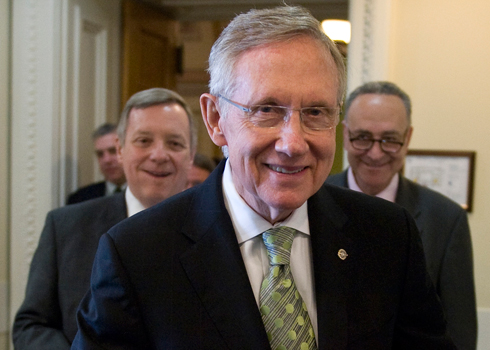Senate Majority Leader Harry Reid (D-NV) has signed off on a deal to raise the debt limit pending the approval of his caucus — and of course if can win the backing of Senate GOP leaders and then a majority of the House.
His spokesman confirms that Reid will present the deal to his caucus shortly, with the hope of holding a vote on it Sunday night, giving House leaders some running room to pass the plan before the nation’s borrowing authority expires late Tuesday.
The deal works like this:
It guarantees the debt limit will be hiked by $2.4 trillion. Immediately upon enactment of the plan, the Treasury will be granted $400 billion of new borrowing authority, after which President Obama will be allowed to extend the debt limit by $500 billion, subject to a vote of disapproval by Congress.
That initial $900 billion will be paired with $900 billion of discretionary spending cuts, first identified in a weeks-old bipartisan working group led by Vice President Joe Biden, which will be spread out over 10 years.
Obama will later be able to raise the debt limit by $1.5 trillion, again subject to a vote of disapproval by Congress.
That will be paired with the formation of a Congressional committee tasked with reducing deficits by a minimum of $1.2 trillion. That reduction can come from spending cuts, tax increases or a mixture thereof.
If the committee fails to reach $1.2 trillion, it will trigger an automatic across the board spending cut, half from domestic spending, half from defense spending, of $1.2 trillion. The domestic cuts come from Medicare providers, but Medicaid and Social Security would be exempted. The enforcement mechanism carves out programs that help the poor and veterans as well.
If the committee finds $1.5 trillion or more in savings, the enforcement mechanism would not be triggered. That’s because Republicans are insisting on a dollar-for-dollar match between deficit reduction and new borrowing authority, and $900 billion plus $1.5 trillion add up to $2.4 trillion.
However, if the committee finds somewhere between $1.2 and $1.5 trillion in savings, the balance will be made up by the corresponding percentage of the enforcement mechanism’s cuts, still in a one-to-one ratio.
Democrats say they’re confident that the enforcement mechanism is robust enough to convince Democrats and Republicans to deal fairly on the committee — to come up with a somewhat balanced package of entitlement reforms and tax increases. However, the White House assures them that if the committee fails to produce “tax reform” he will veto any attempt to extend the Bush tax cuts, which expire at the end of next year.
Unclear, though, is what happens if the committee does agree on tax reform, but in a way that produces insubstantial revenue. If such a plan passes Congress, Obama would be hard pressed to veto it, even if it took the expiration of the Bush tax cuts out of the equation.
At last hearing, Republicans were unhappy with the notion that the enforcement mechanism would contain a one-to-one match of domestic and defense spending cuts — they want spending cuts to be lowered. That may be the final sticking point in this entire debt ceiling saga.






